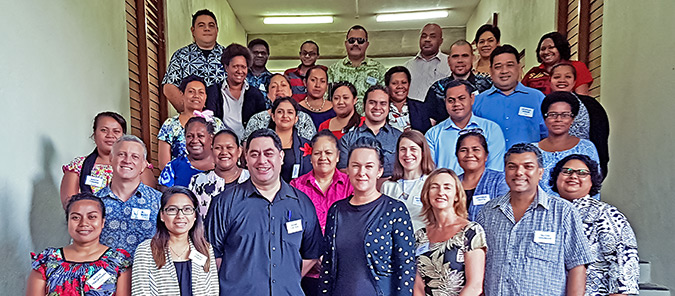National Economies and Commitments to Benefit from Gender Responsive Budgeting
Date:
[Jont Press Release]

Pacific Islands — Decision-makers around the region are being urged to match commitments on gender equality with increased and better targeted funding.

Pacific Islands Forum Secretariat Director for Policy, Sione Tekiteki made the call at a regional training workshop aimed at improving understanding of the financial benefits and impacts of spending on women and men, and planning gender responsive budgets.
“Generally in the Pacific region, targeted government spending on women is very low at around just one per cent of national budgets. This is not enough,” said Mr. Tekiteki.
“Political and policy commitments for gender equality can only be achieved if sufficient funds are allocated for their implementation,” he said.
The need for improved gender responsive budgeting was reiterated at the official opening of the workshop by UN Women’s Multi-Country Office Representative, Aleta Miller.
“We can only achieve an equal society if the needs of both women and men are reflected in our key policies such as budgets,” Ms Miller said.
“The workshop equips the participants with the important tools to start analysing, tracking and ensuring gender equality becomes everyone’s business,” she said.
Supported by the Pacific Islands Forum Secretariat, UNESCAP and UN Women, the Regional Gender Responsive Budget Workshop highlighted how improved budgeting benefits the growth of economies and the achievement of key commitments, such as the Sustainable Development Goals (SDGs).
The regional workshop, held in Suva from 12-13 June, will assist participants to take a more systematic and structured approach to integrating gender into central planning and finance processes, and to identify good practice and useful methodologies to track allocation of resources for gender equality.
“It is quite an eye opener for me!” said Jacob Manase, Assistant Secretary for Policy and Planning – Papua New Guinea Department for Community Development, adding that: “you can have the best gender policy but if you cannot fund it you’ll make no impact.”
Pauline Soaki, Director of the Women’s Development Division - Solomon Islands Ministry of Women, Youth, Children and Family Affairs emphasized the responsibility for ministries to close the gender gap. “Gender responsive budgeting is important because we must meet community needs, but communities have men and women, and they have different needs. We need to bring the financial controllers into the gender equality conversation immediately, to ensure the proportionate allocation of funding for resources.”
Participants from across the Pacific attended the workshop including civil society organisations, development partners, UN agencies, regional organisations, and senior government officials from 13 forum countries.
Media Contacts:
Ariela Zibiah
Communications Officer, Pacific Islands Forum Secretariat
Phone: +679 992 1198
Email: [ Click to reveal ]
Jacqui Berrell
Communications and Media Specialist, UN Women MCO Fiji,
Phone: +679 330 1178 ext 145 or
Email: [ Click to reveal ]
BACKGROUND
Gender Responsive Budgeting (GRB) is a key measure to effectively track resource allocation towards the implementation of global, regional and national commitments to gender equality, including the Pacific Leaders Gender Equality Declaration. The primary purpose of this workshop is to assist the forum island countries to progress gender mainstreaming across central planning and finance processes to ensure stronger gender responsive national systems. At a regional level countries will identify good practices on gender responsive budgeting and useful methodologies to track allocation of resources for gender equality, empowerment of women and girls in all their diversities. The workshop aims to build the capacity central ministries of planning and finance to undertake gender responsive budgets in a systematic and structured manner. In the long term this initiative will support the development of a cadre of skilled GRB technical national experts and regional learning on GRB methodologies and reporting from the Pacific region on key indicator on gender equality. Finally, as the region finalizes the SDGs Roadmap components including means of implementation this workshop will sharpen gender analysis and equip participants will effective tools to engage.